The need for proper exposure in ‘herstory’
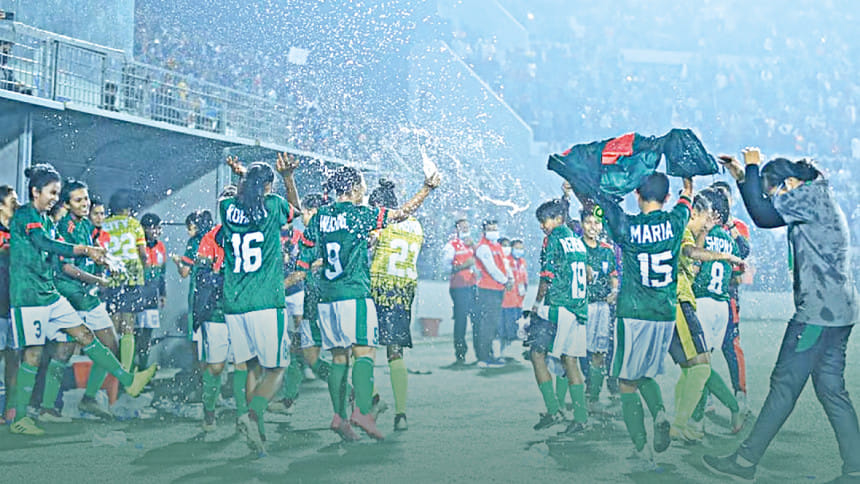
It seems that culturally we are inclined, as if somewhat programmed, to do the bare minimum in providing deserving attention and a wide-scale media coverage when it comes to women's sport in the country despite the fact that women athletes have had been giving their all, working just as hard as their male counterparts, day in day out over the years.
Take the case of Bangladesh women's national team's maiden SAFF triumph in September last year, for instance, when Sabina Khatun and company defeated hosts Nepal to present the country with a trophy that eluded the men's team since 2003.
Following the historic victory at Kathmundu's Dasharath Rangasala Stadium, it was quite bizarre that it almost took forever for the Bangladesh Football Federation's (BFF) official Facebook page to publish the news while many of the success-starved football fans in the country, in the midst of celebration, kept reloading the BFF fan page but only to find the latest post in the form of results of some men's domestic matches that had taken place that day.
It can be said that to nit-pick over the activity of a social media handle is unnecessary but when it comes to this day and age, the power of internet's flow of information to reach on a massive scale has matched the television, if not surpassed it, courtesy of the accessibility of budget-friendly smartphones. A study commissioned by Sky Sports in the UK has shown in 2021 that 32% of people in a survey, conducted since March, 2020, had learned more about women's sport through advertising and social media, while a two-third majority cited an increase in broadcast coverage as their reason for increased attention in the field. Thus, it becomes paramount that the powerful tools are not left unused when Bangladesh football has continued to fail in churning out success, in quantitative terms to say the least, leaving its once-passionate supporters demoralised and pessimistic of the future.
And equally, if not more, strange was how that tournament got little to no national television coverage as supporters resorted to live online streaming at elevensports.com. It was only up until the final that T Sports -- country's lone television channel dedicated to sports coverage -- decided to telecast after mighty India – the then reigning champions, winners of all five editions prior – were forced to exit the semi-finals by the women in red and green in their marauding run to the finale.
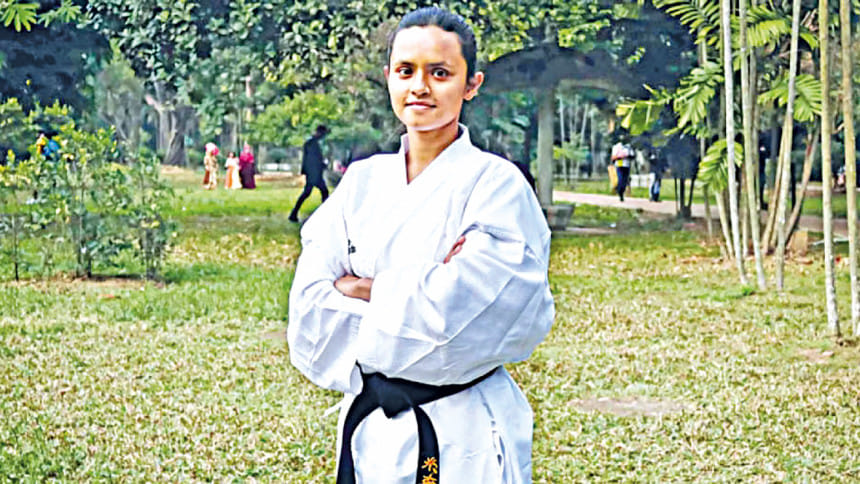
I am facing different obstacles despite being a South Asian Games gold medallist. For example, I can't lead the training session whereas a bronze medallist male karateka leads the training session as a senior player despite having no experience of how to lead a team.
Lack of coverage can happen for several reasons, from financial limitations to failure in acquiring broadcasting license in time to a matter of prioritising over other ongoing events. Back then, the Bangladesh men's cricket team – the most popular team in the country by a landslide – had finished their Asia Cup assignment and so one would like to believe that, in that time, the latter was not the case.
While the ongoing trend in the country's overall news media lingers, of springing into action whenever success arrives in women's sports but lacking its anticipation and the follow-up, there remains a grave concern to whether the ongoing evolution of women's sports in Bangladesh is set for a U-turn in the foreseeable future.
Our women's SAFF success did not arrive as a fluke rather it was well in the making. The golden generation of girls – the likes of Monica Chakma, Maria Manda, Sanjida Akhtar, Rupna Chakma, Rituporna Chakma -- lived up to their reputation and had sealed the SAFF U-19 Women's Championship title in 2021. In line with the global trend that defied the predictions regarding how Covid-19 pandemic was going to flatten the curve of public interest towards women's game, it was pleasantly surprising to witness how enthusiastic were the home crowd that had arrived in numbers, amounting to around fifteen thousand, at the at the Birshreshtha Shaheed Mostafa Kamal Stadium in Kamalapur, Dhaka.
Filled with those aforementioned players who had shown that they are comfortable in thriving under pressure at the big stage, the possibility of the senior team to bag a maiden SAFF title was not far-fetched by any means, and so the broadcasting and advertising, or lack thereof, during and in building up to the tournament had left a lot to be desired.
As far as the positive developments are concerned in terms of exposure, the reception given to the victorious women footballers as they paraded the streets of Dhaka on an open-top bus, from Dhaka airport to BFF headquarters, was unprecedented. Moreover, its impact in promoting women's football, and sports in general, in raising awareness and acceptance among the general population can go a long way in time.
However, the open-top bus parade event could still be treated as a glaring exception to the norm following our success at the international stage brought by women. Another refreshing anomaly recently surfaced on the advertisement front as the Apex Footwear television commercial that starred Jamal Bhuiyan had featured two teenage girls playing football with Bangladesh men's national football team captain on the streets. The makers of that TVC had cashed in on the SAFF success and timed the release to perfection, on the eve of the men's football World Cup in November last year. A month prior, also commendable was how popular local film director Raihan Rafi managed to set the narrative of his "Damal" movie revolve around a group of Bangladesh's female footballers as they derived inspiration from the legendary Shadhin Bangla Football Team that had played a pivotal part during the Bangladesh Liberation War in 1971.
It is quite natural that the followers of a title-winning team find it agonisingly hard to wait to see their side back in action, like how the fans of Argentina men's team eagerly await the Albiceleste's first international match against Panama this month since becoming the world champions in Qatar in December last year. And although the Bangladesh women's senior team is yet to take the field in an international match since SAFF win as they gear up to take part in the Women's Olympic Qualifiers from Asia early next month, but, in between, at least the recent edition of the Women's Football League -- featuring the SAFF winners and others -- was streamed live on BFF's YouTube channel. Now, isn't that the beauty of low expectations!

 For all latest news, follow The Daily Star's Google News channel.
For all latest news, follow The Daily Star's Google News channel. 

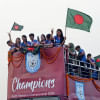
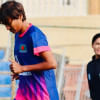
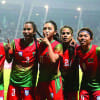
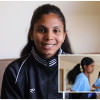



Comments